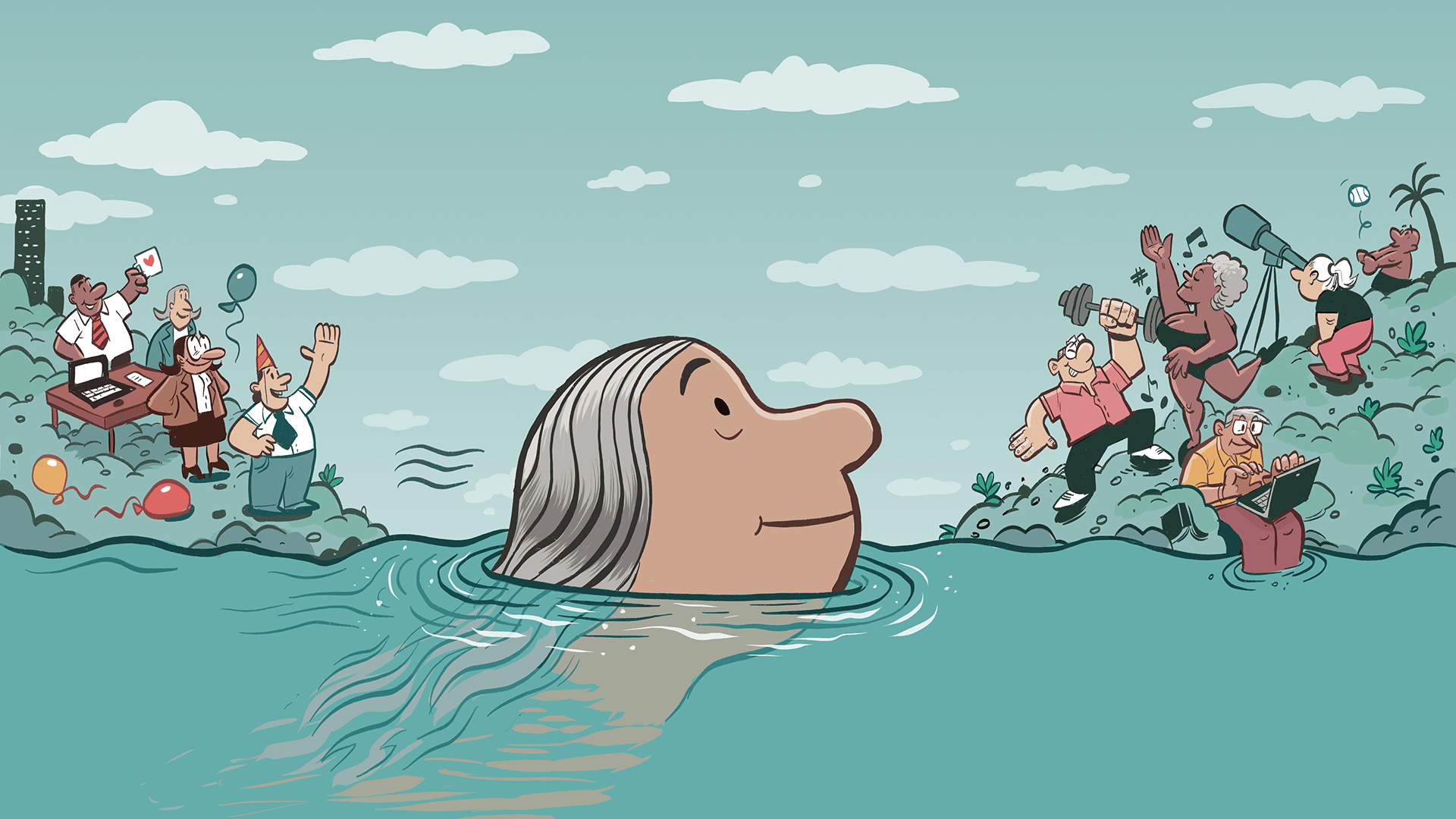
Becoming a SuperAger: How to keep your mind sharp
Cognitive decline can disrupt our financial plans as we age. Here’s how to help keep your brain healthy and finances in check well into your senior years.
We’ve all heard of superheroes. But have you heard of SuperAgers? They don’t possess supernatural powers, but scientific studies suggest they do have a special ability to stay mentally sharp and healthy well into their later years.
Coined by neurologist Marsel Mesulam, the term “SuperAger” is used to describe someone in their 80s who has the cognitive function of someone in their 50s or 60s.1 Mesulam founded Chicago’s Northwestern SuperAging Research Program in 2008 to study populations of mentally vigorous 80-year-olds as a way of learning more about what health, genetic or lifestyle factors can lead to better cognitive abilities. The research comes after nearly a century of increasing average life expectancy: The average Canadian lifetime, for instance, added 24 years over the past century and most of us today will likely hit the age of 82.2 Moreover, our population of 90- and 100-year-olds is among the fastest-growing age groups.3 That means the number of potential SuperAgers is growing.
All of this indicates there’s a chance you too can be quick-witted, fit and active long past retirement age. Who wouldn’t want to be a SuperAger when you hit 80?
Keeping the rocking chair in the attic for as long as possible is great, but unfortunately, some kinds of mental degeneration are inevitable, even for those with SuperAger powers. Natasha Kovacs, a Senior Financial Planner at TD Wealth, says confused thinking can have an oversized impact on your finances.
She recalls one client withdrawing — and hiding away — $26,000 in cash over an unfounded fear they would run out of money. Kovacs says as we age, there’s a chance that we could start making poor spending decisions that deviate from our goals.
We can all aspire to be SuperAgers by learning what causes some people to thrive at age 80, but Kovacs says, as we age and become increasingly vulnerable, it’s also important to focus on protecting our financial health. She says we can start by working with a planner or advisor and sticking to a financial plan — and that relationship doesn’t need to wait until our senior years. Here are some ideas on how to keep your mind and finances in good health as you age.
How do I become a SuperAger?
It’s not nice to contemplate but as the years go by, “our brain cells begin to deteriorate,” says Taryn Grieder, Assistant Professor specializing in neuroscience at the University of Toronto. Cognitive decline is a natural phenomenon: we become forgetful, our brains slow down and we tire more easily.
Unfortunately, while a forgetful moment or two can be normal, not thinking clearly can have consequences. In many cases, we may not even be aware that we’re losing our abilities, which can make us susceptible to poor decisions. You may have climbed a ladder to change a light bulb a thousand times, but will you know when it’s time to call a friend for help? Is giving substantial amounts of money to adult children a good idea when you’re on a fixed income? And if so, what criteria will you use to assess your decision?
Happily, the fundamentals of prolonging mental health are basic: Eat healthily, avoid smoking and exercise regularly. “Daily physical activity is the only thing that we know of that leads to the production of new neurons in an adult brain,” says Grieder. But there are other aspects of our lives that can help maintain our brain health.
Less stress is best
“Stress kills the brain,” says Grieder. Your body’s primary stress hormone, cortisol, can shrink neurons. Some studies even show stomach ulcers and shortened life spans in animals under chronic stress. So how do we release tension? Build a strong social support system. Bottling up our feelings might seem like the right thing to do, but “complaining, getting it out there and having someone empathize” is actually more helpful says Grieder.
"When we start making poor decisions around our spending habits that deviate from our goals, it may be time to reach out for help."
With age, we may begin to become fatigued more easily, turning us into socially inactive homebodies. Instead of going down that route, which can harm us mentally over time, we might learn from the so-called “Blue Zones” — regions of the world where studies indicate people live the longest and healthiest lives. 4 Why? Because the people of these five zones — Sardinia, Italy; Okinawa, Japan; Nicoya, Costa Rica; Ikaria, Greece; and Loma Linda, California — have built strong communities where everyone knows everyone else. Think big family meals where the young ones help out and spend time with the elderly. To be more like the people living in Blue Zones, you might make it a goal to meet friends for coffee once a week, join a club or schedule family dinners more regularly. If you can’t do that, Grieder says even calling a loved one more often can help.
Food for thought…and memory
According to Devon Peart, a Registered Dietitian and Nutritionist at the Cleveland Clinic in Toronto, “the importance of a healthy diet can’t be overstated. It becomes even more important as we age.” That’s because our bodies become less efficient at processing and absorbing certain nutrients from foods, such as vitamin B12 and CoQ10.
For optimal brain health, Peart recommends the MIND diet (Mediterranean-DASH Intervention for Neurodegenerative Delay). This diet contains anti-inflammatory foods such as blueberries, nuts, seeds and extra virgin olive oil, which recent studies indicate significantly reduce the risk of dementia.5 Peart says that people tend to focus on one meal at a time: After eating a greasy burger with fries, you may have blueberries to compensate. Unfortunately, eating one good meal does not negate eating a bad one. Instead, she says maintaining a healthy diet overall — including balanced meals of lean protein, high quality carbohydrates like whole grains and plenty of vegetables and fruit throughout the day — is what improves cognition.
Harder, better, faster, stronger
Even though we don’t need the physical strength to lift a car and wave it above our heads like superheroes, some of us may think we need a vigorous exercise routine to achieve SuperAger status. In reality, you may be surprised by how far low-impact workouts can get you. One study of almost 80,000 participants found that taking just under 10,000 steps a day can reduce the risk of dementia by 50%.6 That’s if you want to achieve optimal results. Evidence shows even obtaining as few as 3,800 steps a day can cut the risk of dementia by 25%. The bottom line: It’s best to keep moving.
Train your brain
Much like exercising our bodies, pushing ourselves mentally can improve cognitive function. A study in the periodical The Gerontologist found that challenging our brains — through brain puzzles, for instance — can boost memory recall and help us process information quicker.7 These mind exercises could include learning a new language, solving math problems or taking up a creative activity like painting. After all, it’s never too late to start something new.
Keep your finances healthy
If we follow these steps, we can give ourselves a better chance to be mentally and physically robust as we age. We may even have a shot at becoming a SuperAger. But the future is unpredictable. Even as we try to stay healthy, sooner or later, age catches up to all of us. We never know when paying bills or investing correctly or even remembering the passwords to our bank accounts might turn into challenging tasks. That’s when a relationship with a financial planner can prove to be beneficial.
“As you age, you may worry more and spend less because you’re thinking about what could go wrong,” says Kovacs. When we start making poor decisions around our spending habits that deviate from our goals, it may be time to reach out for help. Kovacs says in this inflationary economy for instance, “being proactive early on allows you to see if you’re saving enough, earning at the right rate of return and beating inflation.” One question she thinks everyone should ask themselves: Are you taking a long-term approach? That could be applied equally to health and finances, not only in terms of enjoying your money, but also in being prepared for the unexpected.
Part of being proactive is also making sure all your important information is documented, including having a trusted contact person on file. One of the biggest fears people may have of growing old is the possibility of being financially exploited. This is where a financial planner or advisor can help support you with planning for the unexpected. If they feel you’re being taken advantage of or are experiencing diminished mental capacity, they will contact your trusted contact person to check in on you without sharing financial details.
If you’re someone who likes to think ahead, Kovacs says there are a few important items a financial planner can help you put into place, including:
A clear financial plan: Help you set long-term financial goals and ensure there are steps in place to help you get there
A solid estate plan: Working with your lawyer, ensure your Will is up to date and coordinated with your financial plan to help make for a smooth and tax effective transfer of wealth
Proper Power of Attorney documentation: Meet with the person appointed to hold your Power of Attorney to better understand how you want your money to be managed
Ultimately, Kovacs says people may strive to stay in good health for a number of reasons, but undoubtedly, one of them is to enjoy the money they’ve worked so hard for. A “sound mind in a sound body” is the traditional saying, but she thinks sound finances should be added to that equation as well.
KANWAL RAFIQ
MONEYTALK
ILLUSTRATION
DUSHAN MILIC
- M-Marsel Mesulam, “Youthful memory capacity in old brains: anatomic and genetic clues from the Northwestern SuperAging Project” Neurosci. 2013 Jan. 25 (1): 29-36, accessed October 31, 2022, pubmed.ncbi.nlm.nih.gov/23198888/. ↩
- “Health at a glance,” Statistics Canada, last modified November 27, 2015, accessed October 31, 2022, www150.statcan.gc.ca/n1/pub/82-624-x/2014001/article/14009-eng.htm. ↩
- Ninety years of change in life expectancy,” Statistics Canada, Nov. 27, 2015, accessed May 17, 2022, www150.statcan.gc.ca/n1/pub/82-624-x/2014001/article/14009-eng.htm.
“Comparison Age Pyramid,” Statistics Canada, April 3, 2019, accessed Oct. 1, 2019, www12.statcan.gc.ca/census-recensement/2016/dp-pd/pyramid/pyramid.cfm?geo1=01&geo2=01&year=2016&type=2
“A portrait of Canada’s growing population aged 85 and older from the 2021 Census,” Statistics Canada, April 27, 2022, accessed Nov. 1, 2022, www12.statcan.gc.ca/census-recensement/2021/as-sa/98-200-X/2021004/98-200-X2021004-eng.cfm ↩ - “History of Blue Zones,” Blue Zones, accessed November 2, 2022, www.bluezones.com/about/history/ ↩
- Mediterranean-DASH Intervention for Neurodegenerative Delay (MIND) Study: Rationale, Design and Baseline Characteristics of a Randomized Control Trial of the MIND Diet on Cognitive Decline, Contemporary Clinical Trials, Volume 102, March 2021, 106270last modified January 9, 2021, accessed November 2, 2022, www.ncbi.nlm.nih.gov/pmc/articles/PMC8042655/
“Dementia,” World Health Organization, last modified September 20, 2022, accessed October 31, 2022, www.who.int/news-room/fact-sheets/detail/dementia. ↩ - LaMotte, Sandee “Walk this number of steps each day to cut your risk of dementia,” CNN, last modified September 6, 2022, https://www.cnn.com/2022/09/06/health/step-dementia-risk-wellness/index.html. Accessed October 31, 2022 ↩
- “Train your brain,” Harvard Health Publishing, last modified February 15, 2021, accessed October 31, 2022, www.health.harvard.edu/mind-and-mood/train-your-brain. ↩
















